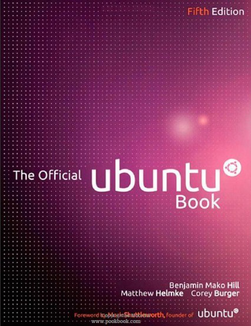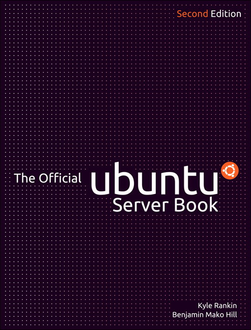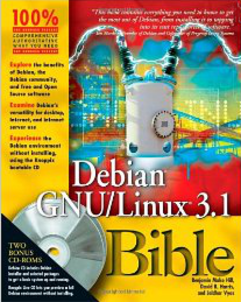Non-Academic Publications
This page contains my non-academic writing: mostly about technology, free software, and peer production. Starting in 2005 or so, my focus in writing switched to the peer-reviewed academic publications on my academic work homepage and the blog posts on my blog copyrighteous. Please keep in mind that much of the material on this page is quite old as a result.
Books
The Official Ubuntu Book (1st ed. 2006; 2nd ed. 2007; 3rd ed. 2008; 4th ed. 2009; 5th ed. 2010; 6th ed. 2011; 7th ed. 2012; 8th ed. 2014): I am the first author of editions 1-6 of the best-selling Official Ubuntu Book co-written with several contributors from the Ubuntu community. After 2012, others took over the leader author role but I was also listed as an author of the 7th and 8th editions. Parts of the book are distributed on official ubuntu CDs and the book is released and distributed under the Creative Commons Attribution-Sharealike license which allows for royalty-free copying, distribution, and modification. The book is published by Pearson's Publishing and has been translated into several languages.
First Edition Book: Complete List of Sources
Translations: German | Spanish | Japanese
The Official Ubuntu Server Book (1st ed. 2008; 2nd ed. 2010; 3rd ed. 2013): I played a supporting role to Kyle Rankin in writing the Official Ubuntu Server Book. The book builds on the solid work in the Official Ubuntu Book but tries to serve a more technically sophisticated audience running Ubuntu in the datacenter. My chapters are released and distributed under the Creative Commons Attribution-Sharealike license which allows for royalty-free copying, distribution, and modification. The book is published by Pearson's Publishing.
First Edition: Amazon | Complete List of Sources
Debian GNU/Linux 3.x Bible (2005): I am the first author of a book co-written with David Harris and Jaldhar Vyas and with the help list of other contributors and editors from the Debian community. The book is geared primarily at beginners and helps introduce Debian's sarge distribution with information on running software on the desktop, on a server and geared either toward an Internet or intranet environment. The book has been translated into several languages.
Find/Buy Books: Complete List of Sources
Publisher's Info Page: Link
Documentation
- The Free Software Project Management HOWTO: The Linux Documentation Project's guide to managing a free software project (latest version: v0.3.4)
Articles and Papers
I write regularly for several blogs and most of my non-academic writing is published in these venues. Primarily, these posts are published on Copyrighteous (my personal weblog), Revealing Errors and Autonomo.us. Because so much of my writing in on these other websites, I have not made any attempt to list essays published there on this page.
- Google Has Most of My Email Because It Has All of Yours: A short article based on data analysis of my inbox that shows that Google has most of my mail even though I do not use Gmail.
Published Online: Blog Post - Remarks for Aaron Swartz MIT Memorial: A transcript of a short speech I gave on March 11, 2013 at a memorial for Aaron Swartz held at the MIT Media Lab.
Republished online: Web Page - Inspired by Aaron: A short set of reflections about being friends with, and inspired by, Aaron Swartz written with SJ Klein and published in Red Pepper.
Republished online: PDF - Freedom for Users, Not For Software: Published in Wealth of the Commons: Another World Is Possible Beyond Market and State edited by Silke Helfrich and David Bollier, Heinrich-Böll-Stiftung. Published in German as Commons: Für eine neue Politik Jenseits von Markt und Staat.
Republished online: Web Page - In Defense of Negativity: A short article, published in the Fall 2011 FSF Bulletin, that explains the important role that so called "negative
campaigns" can have in free software advocacy and in social movements more broadly. (2011-09-04)
Republished online: Web Page - When Free Software Isn't Better: A short article, published in the Fall 2010 FSF Bulletin, about some of the reasons that making a principle stance for
free software is important — especially in situations when free software falls short of some of the claims that
advocates tend to make. (2010-06-04)
Republished online (with links to translations): Web Page - Free Software Needs Free Tools: A short article, published in the Spring 2010 FSF Bulletin, about the use of non-free development tools and services in
the development of free software and why developers should avoid using them. (2010-06-04)
Republished online (with links to translations): Web Page | PDF - The Computer in my Pocket: A short article, published first as a blog post, about the growing danger that mobile phones
pose to their users' technological autonomy. It was put into print as part of the Fall 2009 FSF members' bulletin. (2009-10-17)
Republished Online: Web Page | Link (ES) - Taking a Principled Position on Software Freedom: This short article tries to bring a
fresh approach and voice to the now tired debate between "free software" and "open source" and tries to offer a
strong argument in favor of principled positions — but for "new" reasons. The article was published first on Advogato, the online community of free and open source software developers.
(2009-07-14)
Published Online: Link - Antifeatures: Antifeatures describe features that users of proprietary technology must
pay their developers to remove. This text is an expanded version of a blog post I wrote on the subject of antifeatures. I've
gone on to create an antifeatures talk which I've now given several times and am refining into a new keynote
address. It was published in the FSF's 2007 Fall/Winter bulletin. (2007-12-20)
Published Online: Link - Wikinews and Multi-Pespectival Reporting: I wrote this short article for the MIT Center for Future Civic Media about the Wikinews project. It makes several points about online news reporting while
exploring some of the academic speculation on why the Wikinews project has struggled. (2007-10-03)
Published Online: Link - Free Culture Advanced: A short article published in the FSF Members bulletin making a
call for a free culture movement that parallels the free software movement. (Summer 2007)
Republished here: Web Page | PDF | LaTeX Source - Liberating iPods in Cambridge: In fall 2006, I organized an iPod
Liberation Party. I documented the whole process and project in an article published at Linux.com which
describes my event and gives advice for other who might want to run their own versions. (2006-11-07)
Published Online: Link - Ubuntu Developer Summit Paris Reports: I wrote two articles for NewsForge on the happenings of the Ubuntu developer summit. The articles were
titled Planning for Ubuntu Edgy: A mid-week report from the Ubuntu developer's conference
(2006-06-22) and Ubuntu Developer Summit Paris: New alliances, new horizons
(2006-06-28).
Published Online: Link (Part 1) Link (Part 2) - Notes on the GPLv3: In this featured article at NewsForge, I talk about what I think is really at stake in the GPL revisions
process and how we, as a community, can best proceed to the best possible license. (2005-01-28)
Published Online: Link - Breakfast Cereal and Inband Signaling: I wrote an article on the story of the famous
Cap'n Crunch whistle that could be used to get free phone calls and submitted it, along with an actual
whistle, to an art exhibition called System.hack() at the Multimedia Institute in Zagreb, Croatia. The exhibition aimed to celebrate great
"hacks" and expose them to a larger population of non-hackers. The article was also printed in a book that
accompanied the show.
Publishined Online: Link (English) | Link (Croatian) - Freedom's Standard Advanced?: This is a slightly reworked version of Towards a
Standard of Freedom that I made for Mute Magazine. It was published in Mute Volume 2, Number 1 in
Winter 2005. It is available in the print version and also on Mute's
website.
Published Online: Link - To Fork or Not To Fork: Lessons From Ubuntu and Debian: This essay explores the
experience of the Ubuntu project in creating a distribution derived from Debian as an example of what is becoming
an increasingly important twist on traditional free software development methods. It argues that the scale of
certain free software projects are forcing developers toward a new kind of forking using technologies like
distributed version control and host of other technical and social tools and processes. It explores some of the
early successes and failures of the Ubuntu project in this regard, describes some of the techniques in question,
and argues for the the techniques' applicability and importance in a wide range of free software projects. This
paper was first published in the proceedings of Linuxtag 2005. I am also interested in publishing a version this
article in a magazine or journal. Please contact me if you are interested.
Available: Web Page | Source (git) - Problems and Strategies in Financing Voluntary Free Software Projects (draft):
This essay explores the problems and benefits of paying developers in volunteer free and open source projects and
surveys strategies that projects have used to successfully finance development while maintaining their volunteer
nature. This paper was based off a talk I gave at FISL 5.0 in Porto Alegre and then published in the proceedings
of Linuxtag 2005. I'd like to expand it with input from the larger community and perhaps package it as a Linux Documentation Project HOWTO as I hear they are looking for more non-technical
documents. In addition to the LinuxTag conference proceedings, this was also published on the Free Software
community portal Advogato.
Available: Web Page
Old version re-published Online: Advogato - Towards a Standard of Freedom: Creative Commons and the Free Software Movement: This is a
critical article about Creative Commons that calls for strong ethical position on freedom in creative works and
describes why Creative Commons has become increasingly bad at providing this. It was published on the Free Software
community portal Advogato. A French adaptation was also published on Libroscope.
Available: Web Page | ReST
Re-Published: Advogato (EN) |
Libroscope (FR) - United Article on RFID: This short article on Radio Frequency IDs was commissioned by Mute Magazine. It gives a brief introduction to RFIDs and explors both sides of
the current privacy debate around the technology. It will be appearing in the upcoming print issue of Mute.
(Summer 2004).
Available: TXT - Untitled Article on Bittorrent: The following short article was commissioned by Mute Magazine and appeared the M27 Winter/Spring 2004 edition. (September
2003)
Available: Web Page | PDF | TXT | TeX Source - Software (,) Politics and Indymedia: This essay was commissioned by Mute Magazine although it may be largely reborn before it is read in their
pages. The essay looks at four pieces of software used by Independent Media Centers and the way that the slightly
differing functionality and technical design affects changes in the publishing structure created by the software
and reflecting different political ideologies—toward software and more generally. (March 2003)
Available: Web Page | TXT - The Geek Shall Inherit the Earth: My Story of Unlearning: This is an essay I've written
for Shikshantar, an NGO in India. This is a personal narrative
that describes my journey as a geek and a free software developer. I talk about ADD, Ritalin, activism and
technology. I've put a huge amount of effort, thought, and revision into this and it's quite an easy read. I
encourage you to take a look at it. It was published in Vimukt Shiksha in print and availble Link. (November 2002)
Available: Web Page | TXT | SGML Source
Unpublished Undergraduate Academic Projects
As undergraduate work, I think of these as largely non-academic. Please keep in mind that they are written by an undergraduate student and that many were written during my first and second years.
- Literary Collaboration and Control: This is my final undergraduate project at Hampshire
College. It seeks to leverage an analysis of collaborative literary creation from historical, technological, and
legal philosophical perspectives toward a critique of individualized literary control. (May 2003)
Available: Project Homepage - Short Essays from Stephen Harris's Origins of Reading: Feel free to check out the course website or the professor's website. As part of my work for the class, I'm
writing a series of short (500 and 1500 word essays) which attempt to ask questions about reading on, through, and
with new technology. So far, I've uploaded the following essays which I think other people might want to take a
look at:
- Thoughts on Computers, Readers and Text as Data (Final Paper) (PDF)
- Bibliographies and Markup (PDF)
- Procedural and Descriptive Markup: DocBook and HTML (PDF)
- LyX: Challenging the Word Processor as Typesetter (PDF)
- Kuro5hin: Online Moderation and the Democratization of the Editor (PDF)
- She Hate My Futon and Literary Reinvention through Technology (PDF)


